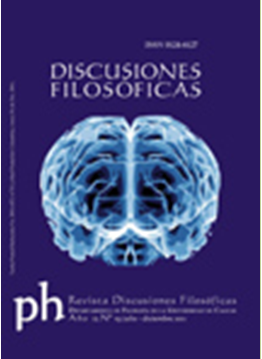Authors
Abstract
Irony is rarely discussed from a philosophical perspective and even less when it is a question of Metaphysics, like the problem of truth or the question of the subject. From Hegel to our days only occasionally scholars have studied irony and, for this reason, thinkers as the ironic Michel de Montaigne are often considered marginal authors in the history of philosophy, despite his central contribution to the modern philosophical style with the essay. In this article, I propose a metaphysical reading of the work of this French author taking care of the ironic style of his essays. Taking into account the notions of knowledge and subjectivity I will analyze the readings that have been done on "the Socratic" character of the Essays showing their philosophical relevance and, therefore, the weight of the concept of irony in any contemporary philosophical reflection.
References
Cameron, Keith C. “Montaigne and the mask”. L’Esprit créateur, 8/3. 1968: 198-207. Imprimé.
Fernandez, J. W. & Huber, M. T. (Eds.). Irony in action. Chicago and London: University of Chicago Press, 2001. Print.
Glidden, David K. “Holy Philosophy”. Religion 29. 1999: 353-367. Print.
Joukovsky, François. “Qui parle dans le livre III des Éssais?”. Revue d’Histoire littéraire de la France 5. 1988: 813-827. Imprimé.
Kellermann, Frederick. “The Essais and Socrates”. Symposium, L. 1956: 204-216. Print.
Laursen, John Christian. The politics of skepticism in the ancients, Montaigne, Hume and Kant. Leiden and New York: E. J. Brill, 1992. Print.
Magalhaes-Vilhena, Vasco de. Le problème de Socrate. Paris: PUF, 1952. Imprimé.
Marrades, Julián. “Comprensión del sentido y normas de racionalidad. Una defensa de Peter Winch”. Crítica, Revista Hispanoamericana de Filosofía 30. 1998: 45-93. Impreso.
McGowan, Margaret M. Montaigne’s deceits: the Art of persuasion in the Essais. Philadelphia: Temple University Press, 1974. Print.
Meijer, Marianne S. “Guesswork or facts: connections between Montaigne’s last three chapters”. Yale French Studies 64. 1983: 167-179. Print.
Montaigne, Michel de. Oeuvres completes. Paris: Gallimard, 1962. Imprimé.
Nehamas, Alexander. El arte de vivir. Reflexiones socráticas de Platón a Foucault. Valencia: Pre-Textos, 2005. Impreso.
Porteau, Paul. Montaigne et la vie pédagogique de son temps. Paris: Droz, 1935. Imprimé.
Regosin, Richard L. The Matter of my book. Montaigne’s Essays as the book of the self. Berkeley, Los Angeles and London: University of California Press, 1977. Print.
Rigolot, François. “Les ‘Visages’ de Montaigne”. M. Soulie. (Ed.). La littérature de la Renaissance: Mélanges offerts á Henri Weber. Genève: Slaktine, 1984. Print.
Starobinski, Jean. Montaigne en movement. Paris: Gallimard, 1982. Imprimé.
Tournon, André. “Les prosopopeés ironiques dans les Essais”. Frank Lestringant. (Ed.). Rhétorique de Montaigne. Paris: Champion, 1985. Imprimé.
---. “Les preteritions marquees ou le sens de l’inachevement”. Claude Blum (Ed.). Montaigne et les “Essais”: 1588-1988. Paris: Champion, 1990. Imprimé.
Versenyi, Laszlo. Socratic humanism. New Haven: Yale U. P, 1972. Print.
Vlastos, Gregory. (Ed.). The philosophy of Socrates. New York: Anchor Books, 1971. Print.
---. Socrates, ironist and moral philosopher. Ithaca and New York: Cornell U. P., 1972. Print.
Wittgenstein, Ludwig. Investigacions filosòfiques. Barcelona: Edicions 62. 1997. Imprès.
Woolf, Virginia. “Montaigne”. The common reader: first series. New York: Harcourt Brace, 1984. Print.

 PDF (Español)
PDF (Español)
 FLIP
FLIP
























